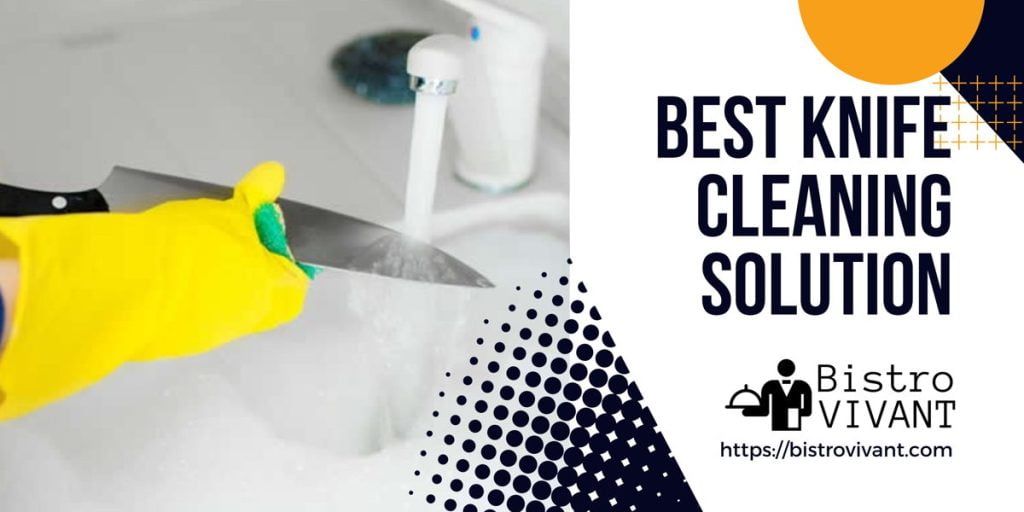The best knife cleaning solutions play a crucial role in maintaining the longevity and performance of your knives. Keeping your knives clean is not just about aesthetics; it’s essential for hygiene, safety, and preserving the integrity of the blade. Different types of knives, ranging from stainless steel to ceramic, have unique cleaning requirements.
Understanding these needs is key to selecting the best knife cleaning agent for your kitchen. Regular and proper cleaning ensures that your knives remain sharp, rust-free, and safe for everyday use, thereby enhancing your culinary experience.
Understanding Knife Materials
When discussing Top Knife Cleaning Products, it’s crucial to understand the different types of materials used in knife blades. This understanding is vital, as the material of the blade significantly influences the appropriate cleaning methods. Here, we will explore the common materials used in knives and how they affect cleaning practices.
Stainless Steel
Stainless steel is one of the most popular materials for knife blades. It’s known for its durability and resistance to rust and corrosion. When cleaning stainless steel knives, it’s safe to use a variety of cleaning solutions, including mild dish soap and water. These knives can typically handle more abrasive cleaners if needed, but it’s always best to stick to gentler methods to preserve the blade’s integrity.
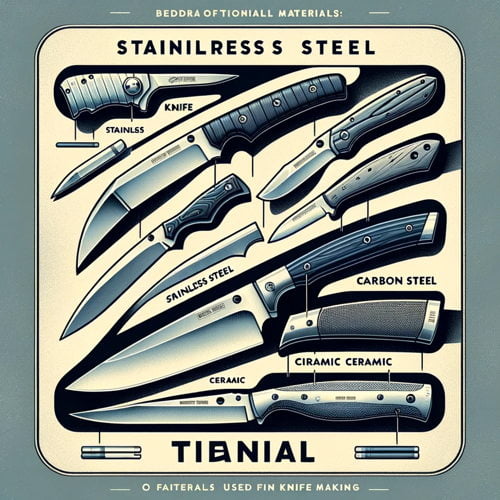
Carbon Steel
Carbon steel knives are prized for their sharpness and edge retention. However, they are more prone to rust and discoloration than stainless steel. For carbon steel knives, it’s essential to use non-abrasive cleaners and to avoid prolonged exposure to water. After washing, these knives should be dried immediately. Some users apply a thin layer of mineral oil to protect the blade from moisture and rust stains.
Ceramic
Ceramic blades are known for being extremely hard and maintaining their sharpness for a long time. They are also resistant to corrosion and rust. However, they can be brittle. For cleaning ceramic knives, gentle soap and residual water are best. Avoid using abrasive sponges or brushes, as these can damage the blade’s surface. Dry the ceramic knives thoroughly after washing to prevent any water spots.
Damascus Steel
Damascus steel is renowned for its distinctive wavy pattern and is often used in high-quality knives. The process of making these blades typically involves layering various steel types. Cleaning Damascus steel knives usually requires the same care as carbon steel knives. It’s important to avoid harsh chemicals and abrasive materials. Regular maintenance is crucial to preserve the blade’s unique pattern and prevent rust.
Titanium
Titanium knives are lightweight, durable, and resistant to corrosion. They don’t require special cleaning solutions; mild soap and a bowl of water will suffice. However, as with other high-quality knives, avoid using abrasive materials that can scratch the surface.
Understanding the material of your knife blade is key to selecting the best knife cleaning agent. Each material has its own needs and vulnerabilities, which should guide your choice of cleaning methods. Proper care and maintenance of your knives not only keeps them clean but also extends their lifespan and performance.
Key Factors
When it comes to maintaining your kitchen knives, selecting the best cleaning solution is crucial. There are several key factors to consider that ensure the longevity of your knives and the safety of your kitchen environment. Understanding these factors can help you make an informed decision about which product to choose.
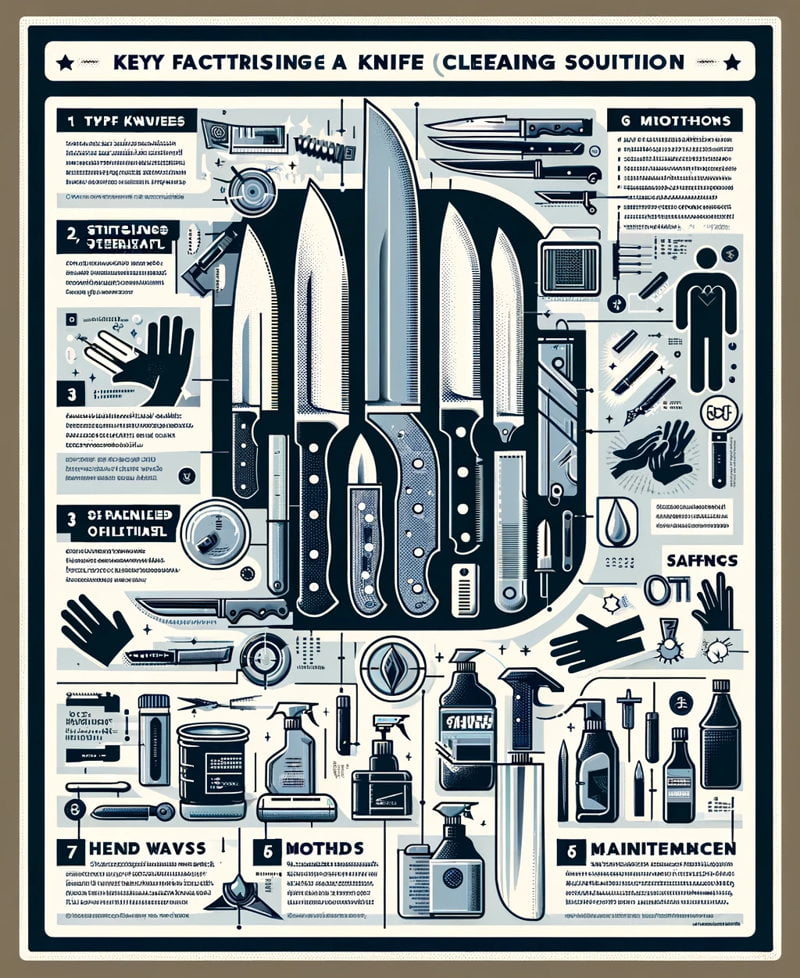
The Role of pH Levels in Cleaning Solutions
The pH level of a cleaning agent is a critical aspect to consider. The pH scale measures how acidic or alkaline a substance is, ranging from 0 to 14. A pH of 7 is neutral, below 7 is acidic, and above 7 is alkaline. The knife cleaning solution for knife blades should ideally have a neutral pH level.
Acetic acid solutions can corrode metal knife blades, especially those made from high-carbon steel, while alkaline solutions can leave a residue that dulls the blade over time. A neutral-pH cleaner ensures that the blade’s integrity is maintained without causing harm.
Importance of Non-Abrasive Formulas
Another important factor is choosing a non-abrasive formula. Abrasive cleaners can scratch and damage the surface of your knives, particularly those with a polished or mirror finish. This not only affects the appearance of your knives but can also create small crevices where bacteria can grow, potentially contaminating your food.
Therefore, the best knife cleaning solutions should be gentle yet effective in removing food particles, oils, and other residues without damaging the blade.
Consideration for Food Safety and Environmental Impact
Finally, any knife cleaning agent used in the kitchen must be safe for contact with food. This means it should be free from toxic chemicals that could transfer to food items. Additionally, considering the environmental impact of the cleaning solution is increasingly important.
Eco-friendly and biodegradable solutions are preferable, as they reduce the harmful effects on the environment. The cleaning agent will be one that effectively cleans your knives while also being safe for you, your food, and the planet.
Top Knife Cleaning Chemical Solutions
Top Knife Cleaning Brushes and Clothes
DIY Natural Knife Cleaning Solutions
The best knife cleaning solutions don’t always mean store-bought chemicals. In fact, many effective cleaning solutions can be made right at home using everyday household items. These DIY natural solutions not only clean your knives effectively but are also kind to the environment and gentle on the materials of the knives.
Everyday Items for Knife Cleaning
- Vinegar and Water: Vinegar is a natural disinfectant and grease cutter. Mix equal parts white vinegar and water in a spray bottle. This solution is particularly good for removing stubborn stains and rust spots on knives.
- Baking Soda Paste: For tougher stains, make a paste using baking soda and water. Apply this paste to the blade, leave it for a few minutes, and then scrub gently with a non-abrasive sponge. This is especially effective for ceramic knives, as it doesn’t scratch the surface.
- Lemon Juice: Lemon’s natural acidity helps in removing stains and also leaves a fresh scent. Rub a slice of lemon directly on the knife blade, or use lemon juice diluted in water for a gentle clean.
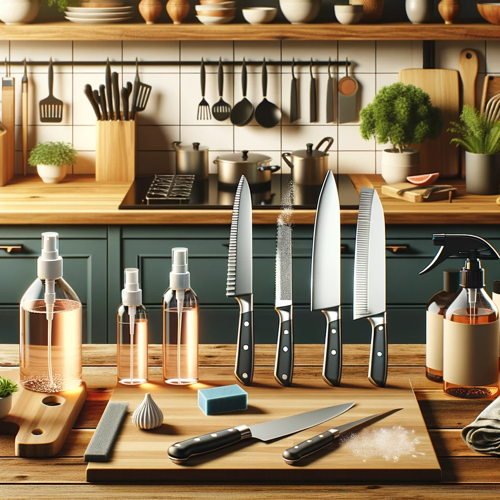
Tips for Effective Cleaning
- Always Dry Immediately: After using any cleaning solution, dry the knife immediately with a soft cloth. This prevents water spots and rusting, especially on carbon steel knives.
- Use Non-Abrasive Tools: When scrubbing your knife, use a soft sponge or cloth to avoid scratching the surface.
- Regular Maintenance: Regular cleaning after each use helps prevent the buildup of dirt and bacteria. This makes deep cleaning easier and less frequent.
- Storage: Proper storage after cleaning is crucial. Use a knife block or magnetic strip to prevent the knives from getting dull and to keep them out of reach of children.
Using these simple, best knife cleaning solutions tips with natural ingredients, you can maintain your knives in top condition, ensuring they are clean, safe, and ready for your next culinary adventure.
Safety First: How to Clean Knives Safely
Cleaning knives is an essential part of kitchen safety and hygiene. However, if not done carefully, it can lead to accidents. Here’s a step-by-step guide on safe cleaning practices to avoid injuries, along with recommended tools and accessories.
Step-by-Step Guide to Safe Knife Cleaning
- Prepare Your Cleaning Area: Ensure your sink is clean and uncluttered. Having a clear space reduces the risk of a knife slipping or causing injury.
- Use the Right Cleaning Solution: Choose the best solution that is effective yet gentle on the knives. Avoid harsh chemicals that can damage the knife or be hazardous to your health.
- Wear Cut-Resistant Gloves: Before handling the knife, wear cut-resistant gloves. These gloves provide a good grip and protect your hands from accidental cuts.
- Handle with Care: Always hold the knife by the handle, never by the blade. Make sure the blade is pointed away from you.
- Gentle Cleaning: Use a soft sponge or cloth to apply the cleaning solution. Gently scrub the blade from the spine to the edge, moving away from your body to reduce the risk of injury.
- Rinse Thoroughly: After scrubbing, rinse the knife under running water. Point the blade downward to prevent water from running onto your hand.
- Dry Immediately: Use a soft towel to dry the knife immediately after washing. This prevents water spots and rust, especially on carbon steel knives.
- Safe Storage: Once the knife is clean and dry, store it in a knife block, sheath, or magnetic strip. Proper storage not only protects the knife’s edge but also reduces the risk of accidentally reaching into a drawer and cutting yourself.
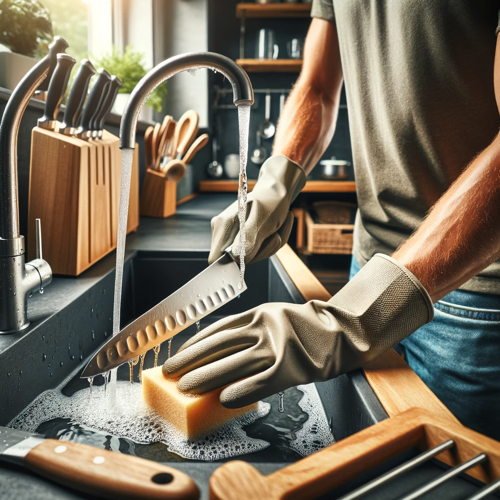
Tools and Accessories for Safe Knife Cleaning
- Cut-Resistant Gloves: These gloves are a must-have for anyone who frequently cleans knives. They offer protection and a better grip.
- Soft Sponges and Cloths: To prevent scratching the blade, use soft cleaning materials.
- Mild Detergent: A mild, non-abrasive detergent is ideal for most knives and will help maintain their sharpness and finish.
- Knife Block or Magnetic Strip: These storage options keep knives out of the way and safely stored.
- Drying Towel: A soft, absorbent towel ensures quick and safe drying of the knives.
Before we make any final decisions, let’s revisit our picks to ensure we’re on the right track.
Conclusion
Selecting a Premier knife cleaning agent is crucial for maintaining the longevity and performance of your kitchen knives. A good cleaning agent not only ensures that your knives are free from bacteria and residue but also helps in preserving their sharpness and luster. It’s important to choose a solution that is suitable for the material of your knives and is effective yet gentle to avoid any damage.
Whether you opt for one of the top commercial solutions or prefer a natural, DIY approach, remember that the Ultimate knife care solution is the one that aligns with your kitchen needs and knife care practices. Regular cleaning with the right solution will keep your knives in top condition, ensuring they are always ready for your culinary adventures.
FAQs
Q1: Is it safe to use bleach on knives?
Ans: It’s generally not safe to use bleach solution directly on knives. Bleach can corrode the metal and potentially damage the blade. If necessary, you can dilute bleach heavily and use it sparingly, followed by thorough rinsing and drying. However, it’s best to opt for milder cleaning solutions to preserve the integrity of your knives.
Q2: How can I disinfect my kitchen knives?
Ans: To disinfect kitchen knives, wash them with hot, soapy water, then rinse thoroughly. Next, immerse the knives in a solution of one tablespoon of chlorine bleach per gallon of water for about one minute. Rinse again with clean water, and dry thoroughly with a clean towel. Ensure the knives are completely dry before storing them to prevent rusting. This method effectively kills bacteria and viruses, keeping your knives clean and safe for use in food preparation.
Q3: What should I avoid when cleaning my knives?
Ans: When cleaning knives, avoid soaking them for prolonged periods, as it can lead to corrosion. Additionally, refrain from using abrasive cleaners or scrubbers that may scratch the blade. Extreme temperatures should also be avoided, as they can damage the knife’s integrity.
Always dry knives immediately after washing to prevent water spots and rust formation. Proper care and maintenance will ensure your knives remain sharp and in optimal condition for longer periods of time.
Q4: What’s the best way to dry knives?
Ans: The best way to dry knives is to hand-dry them immediately after washing. Use a soft towel to gently wipe the blade and handle until they’re completely dry. Avoid air drying or leaving knives to drip dry, as this can lead to water spots or rust formation. Ensuring they’re thoroughly dried after washing helps prevent corrosion and maintains the sharpness of the blade.
Q5: What is the cleaning agent for knives?
Ans: The primary cleaning agent for knives is mild dish soap combined with hot water. This solution effectively removes food residue and bacteria without damaging the blade or handle. It’s important to avoid harsh chemicals and abrasive cleaners, as they can corrode the metal and degrade the knife’s sharpness over time. Additionally, proper drying after washing is crucial to prevent rust and maintain the knife’s quality.
 https://bistrovivant.com is a participant in the Amazon Services LLC Associates Program, an affiliate advertising program designed to provide a means for website owners to earn advertising fees by advertising and linking to Amazon (.com,.co.uk,.ca, etc.) and any other website that may be affiliated with the Amazon Service LLC Associates Program. As an Amazon Associate, I earn from qualifying purchases.
https://bistrovivant.com is a participant in the Amazon Services LLC Associates Program, an affiliate advertising program designed to provide a means for website owners to earn advertising fees by advertising and linking to Amazon (.com,.co.uk,.ca, etc.) and any other website that may be affiliated with the Amazon Service LLC Associates Program. As an Amazon Associate, I earn from qualifying purchases.

